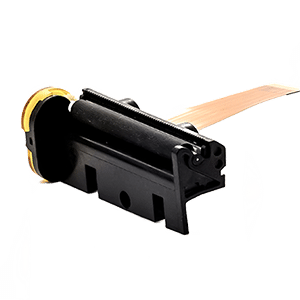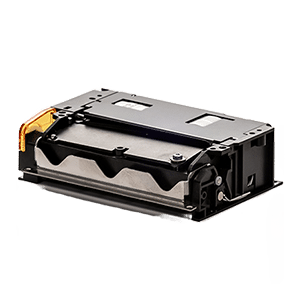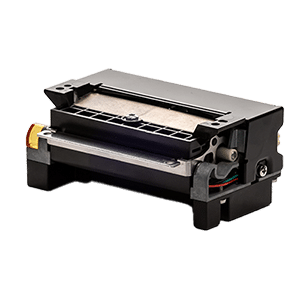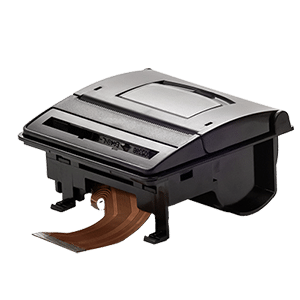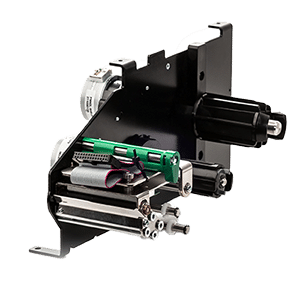
On-board weighing system thermal printers and mechanisms

Reliable printing solutions for cargo and weight monitoring in transportation
On-board weighing systems are essential in commercial transportation, where monitoring the weight of vehicles and their cargo is crucial for ensuring safety, compliance, and operational efficiency.
APS’s thermal printers and mechanisms provide accurate and immediate printouts of weight data, allowing drivers and operators to have a clear, verifiable record of their load’s weight.
Whether in trucks, trailers, or heavy machinery, APS thermal printers and mechanisms deliver reliable and durable printouts that meet industry standards and regulatory requirements.
Explore our thermal printer range
Why choose APS for your on-board weighing system printers ?
APS thermal printers and mechanisms are designed to meet the specific challenges of on-board weighing systems used in transportation and logistics. Here’s why APS is the ideal partner for your vehicle weight monitoring needs :
Precision printing
APS printers produce accurate, high-resolution printouts of weight data, ensuring that drivers and fleet operators have clear, verifiable records of cargo weight. This accuracy helps prevent overloads and supports compliance with safety regulations.
Built for harsh environments
On-board weighing systems are often exposed to tough conditions such as vibration, dust, and temperature fluctuations. APS thermal printers and mechanisms are built to withstand these environmental challenges, ensuring that they continue to operate smoothly in demanding scenarios.
Compact and
space-saving design
APS understands that every vehicle system may have unique requirements, and we specialize in delivering customized thermal printing solutions tailored to your specific needs. Whether you require particular connectivity options, paper handling features, or environmental protection, APS works closely with your team to create a printer that seamlessly integrates with your on-board weighing system.
Energy efficiency
Our thermal printers and mechanisms are energy-efficient, making them ideal for on-board applications where power consumption is a concern. They can operate for extended periods without placing a strain on the vehicle’s electrical systems.
ISO 9001:2008 certification
APS holds the ISO 9001:2008 certification, audited by Intertek for its automotive sector products. This certification assures that APS thermal printers and mechanisms meet global automotive industry standards, delivering consistent quality, reliability, and safety, while focusing on customer satisfaction and continuous improvement.
Bespoke solutions
APS understands that every vehicle system may have unique requirements, and we specialize in delivering customized thermal printing solutions tailored to your specific needs. Whether you require particular connectivity options, paper handling features, or environmental protection, APS works closely with your team to create a printer that seamlessly integrates with your on-board weighing system.

Looking for a reliable thermal printer or mechanism for your on-board weighing system?
At APS, we specialize in providing custom thermal printing solutions specifically designed for on-board weighing system receipt printing. Whether you need a compact design for space-saving integration or high-speed printing for efficient data logging, we will create a solution that perfectly fits your fleet management needs.
Request a Custom Quote Today and see how APS can elevate your automotive printing processes with unmatched reliability and performance.

The importance of thermal printers for on-board weighing systems
In the world of heavy-duty transport, accurate weight data is critical for preventing overloads, maintaining safety standards, and avoiding fines. On-board weighing systems provide real-time data, and having a thermal printer integrated into these systems allows operators to produce immediate, accurate weight tickets at the point of measurement.
Thermal printers are ideal for on-board weighing systems due to their speed, precision, and low maintenance.
In industries where trucks are often loaded and unloaded on the move, the ability to print weight records on-site reduces the risk of exceeding legal load limits, which can lead to penalties or operational delays.
Additionally, thermal printouts are durable and smudge-proof, which ensures that records remain clear and legible even in demanding environments. This durability is key in transport and logistics, where documentation may need to withstand handling, varying temperatures, and humidity. Having reliable printouts also provides drivers and fleet managers with the proof they need for compliance during inspections or audits.
Key factors to look at when selecting a thermal printer or a mechanism for tachograph applications
When choosing a thermal printer or mechanism for tachograph systems, it is important to consider several key factors to ensure the printer can handle the demands of fleet management, regulatory compliance, and long-haul operations. Here are the top factors to consider :
- Reliability and Durability : In tachograph applications, printers must perform reliably under varying and often challenging environmental conditions. The printer should be able to withstand extreme temperatures, vibration, and dust without compromising performance. Since many fleet vehicles operate in rugged conditions, ensuring the printer is built for durability will minimize the risk of breakdowns and reduce the need for frequent maintenance.
- Print Speed and Accuracy : Quick, high-quality printouts are essential in fleet management, where real-time data, such as driving hours, speed, and rest periods, need to be accessible instantly. A thermal printer for tachographs should be fast enough to deliver clear, legible records without causing delays for drivers or operators.
- Compatibility with Tachograph Systems: The thermal printer or mechanism must seamlessly integrate with the existing tachograph system in vehicles. Look for printers or mechanisms that are compatible with various tachograph models and have the necessary connectivity options to ensure smooth communication between the tachograph and the printer or mechanism.
- Paper Handling and Autonomy: For fleet operators, reducing downtime is crucial. Selecting a thermal printer or mechanism with long paper rolls can provide extended autonomy, minimizing the need for frequent paper changes. This is particularly useful for long-haul trucks where drivers may be on the road for extended periods, reducing the chance of running out of paper mid-route.
- Energy Efficiency: Energy consumption is a critical factor when integrating a printer into a vehicle’s electrical system. A thermal printer or mechanism for tachographs should be energy-efficient, ensuring it does not drain the vehicle’s battery unnecessarily. Look for printers or mechanisms that are designed to consume minimal power while maintaining fast and accurate printouts.
- Ease of Use and Maintenance: In fleet management, simplicity is key. Drivers should be able to operate the printer with minimal training, so features like one-touch paper loading and user-friendly interfaces are important. Additionally, thermal printers are preferred for their low maintenance compared to traditional ink or toner-based printers, making them more suitable for vehicles that require consistent uptime.
- Regulatory Compliance: Since tachographs are used to ensure compliance with driving time and rest period regulations, the thermal printer or mechanism must be able to produce tamper-proof, verifiable records that meet legal standards. The printouts should be durable enough to withstand handling and storage over long periods without fading or becoming illegible, ensuring they remain valid for audits or inspections.
Looking for the perfect thermal printer or mechanism for your tachograph systems ?
APS offers custom solutions designed to fit your fleet management needs. Request a quote today and discover how APS can help improve your operational efficiency and compliance.


